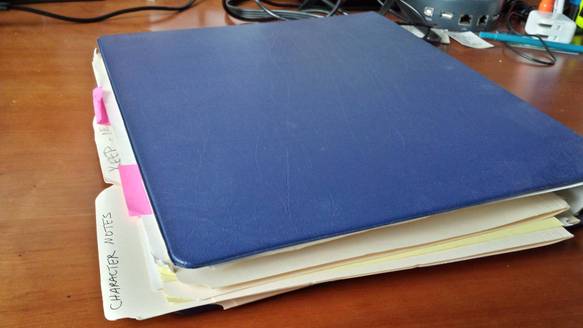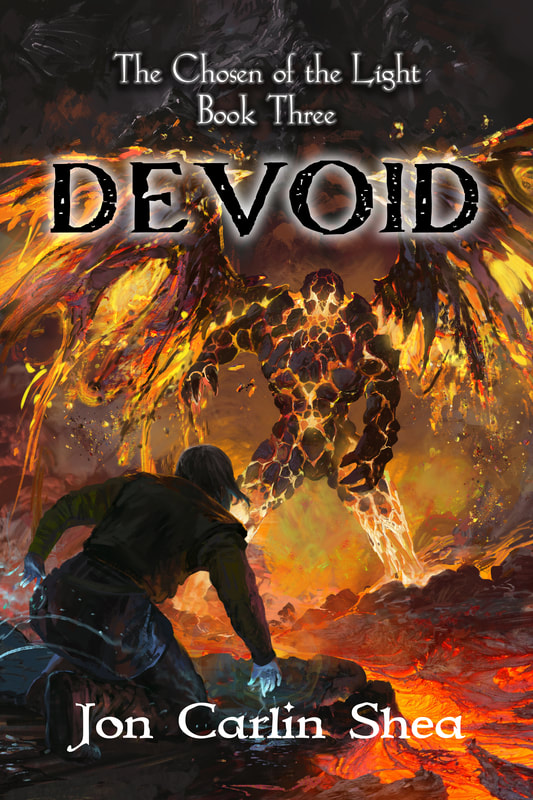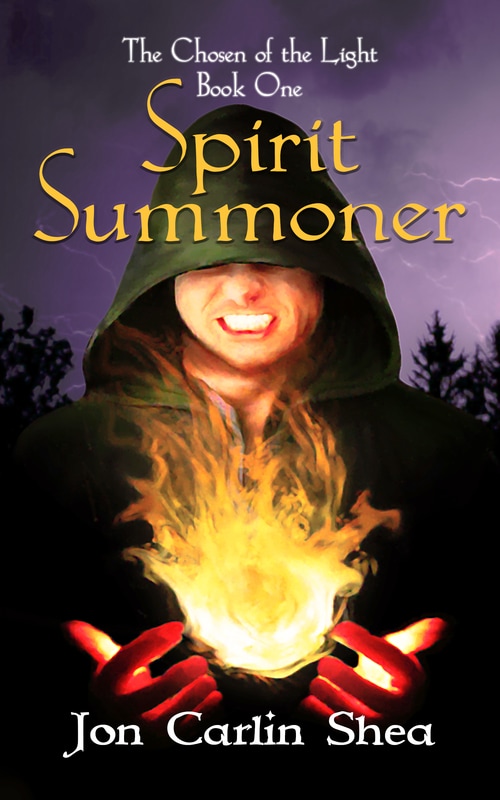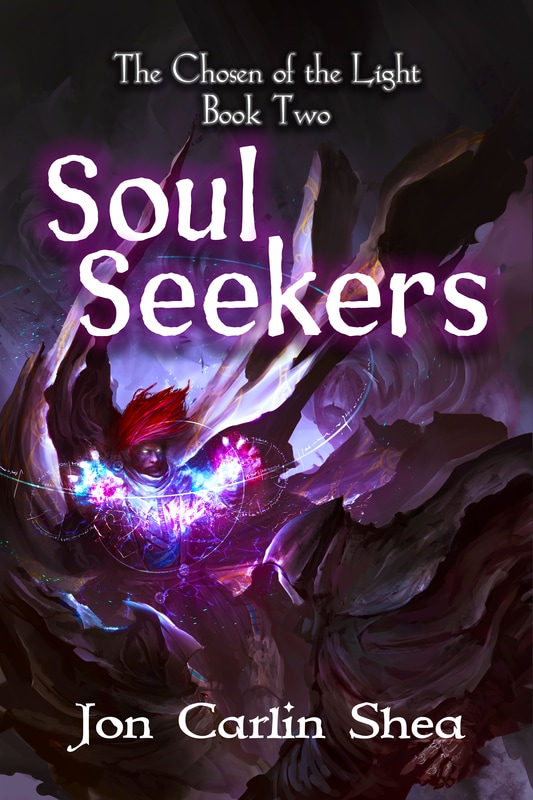|
Time sure has flown since I finished The Chosen of the Light. Almost twenty years ago, I completed my first manuscript at about 300,000-words. I knew Chosen still needed work, and since I was beginning my college education in English Creative Writing, I decided to put it on hold for a while. Yet, even though I was putting away Chosen for the time being, my brain was still on fire. My worlds continued to expand in my imagination, pushing out on the walls of reality, spilling out into my everyday life.
Something unexpected happened though. I found I was bored with Chosen’s world. It wasn’t that I had nothing more to tell. I certainly did, but my imagination was bristling with newfound confidence in my storytelling and writing abilities. Something else lurked within my imagination, something different that would not work in Chosen’s world. Something New was about to emerge. I eagerly began work. The Beginning of Something New When I first started work on Something New, I had a loose idea of how I wanted the story to go. This is not my normal modus operandi. When I began writing Chosen, I had the story mapped out in my head and on a series of outlines. I knew my characters, I knew where they were going, and I knew the major obstacles they would overcome. I began writing Something New in a much different way. I had a few of my major characters figured out, as well as some of the trouble that would befall them. Most worrisome of all, I had only a general outline (they go here, then they go here, then they go here). My first couple of chapters started okay, but by the third or fourth chapters, my story was lost. My characters were directionless, my system of magic seemed superfluous, and the world I’d created was bland. At the time, I was struggling with the idea that I wasn’t a writer who needed a step-by-step outline, but my story just wasn’t coming together, and my writing was awful. Outlines for Dummies For some reason, my early writer’s brain told me that I shouldn’t use an outline. I probably read an article or two by some hoity-toity writer who said “blah blah blah I never use an outline because writing should come from your core”. Being the young and impressionable writer I was, I ignored my own writing style and tried to fit someone else’s mold. This was a big mistake. Though I’d written close to 150 pages, I considered it all awful. My characters were empty toys shuffled around in a cardboard cut-out world. The worst part was I lost a lot of confidence in myself. If I couldn’t write from my gut, how could I be a good writer? I put Something New away for a while, picking it up on a whim a couple years later when I moved away for college. I was older. I was wiser. Outlining was an integral piece to my writing method, and it was silly to try otherwise. I found my old notes on Something New and began outlining like the old days. Suddenly, I had a story again. My characters had faces, dispositions, and histories. My world also had a history, dotted with cultures that shaped the landscape. I began to get more excited about writing as the story I knew was there took shape. A beginning and an end to the story stood revealed at last, and the journey in between was mostly evident. Everything was falling nicely into place… Too Much Story Something New was becoming something scary. Anxiety can be a huge problem for writers, and oftentimes, shows the difference between a professional writer and an amateur. I’ll take the hit and say at this time in my life, I was certainly amateurish in my writing. While I had this story to tell, and an outline leading me there, the story was taking on a life of its own. No longer was Something New confined to one book. Something much grander was at work with this story. In my creation of outlines, detailing a history for the world of Something New, I inadvertently planted seeds that would have far-reaching consequences (my overactive imagination hard at work). In fact, the outline as I’d written it, only told a fraction of the story I wanted to tell. The Blocked Writer How could I possibly begin writing a story I had no outline for? Sure, the first book in the series was mostly framed, but what if I wrote something that couldn’t be taken back later? The arch I had in mind would intertwine two stories, taking them first one way in time, and then another. I had to be very careful about how I told the story or else I could never take back my own words. I refused to think outside my grand idea. I had to finish my outline before I wrote a single word or else I would only be repeating past mistakes. Wrapped up in my anxieties and blocked by my own rigid rules, I completely forgot about actually writing the story. In the next couple years, I compiled hundreds of notes, maps, outlines, character descriptions, and histories that I had to contain in a 2” binder. My early notes collided with my current notes, oftentimes leaving me confused and aimless. In the end, I put Something New back on the shelf for another time. I had begun rewriting Chosen, and Something New was only a pet project. At least, that’s how I justified it. Telling the Story PERFECTLY Over the next few years, I didn’t touch Something New. Even when I wasn’t working on Chosen or one of my other stories, I ignored it. Something New had become Something Unattainable. Any time I’d even think about that giant binder of notes, anxiety would freeze me in my tracks. Part of me hoped the story would work itself out, the other part hoped I would simply forget about the grand ideas I had and just write a story. But neither part of me got a response. A few years ago, when I first started to shop around Chosen, I was cleaning up some old files out of my desk and I came across that ancient blue binder that held all my notes about Something New. I opened it, flipped through the pages, and overnight, the story exploded inside my brain in fragments. The next night Jen saw me pouring over stacks of notes scattered across the dining room table. She asked me what I was working on. I was hesitant. I didn’t want to tell her anything, even verbally, because I was afraid I’d screw it up. That’s when I realized my hesitation wasn’t about fear. It wasn’t even about outlining. It was about perfection. I wanted Something New to be a perfect story. As I sat there, looking at Jen with the words stuck in my throat, I realized how crazy I was being about this. I don’t think there’s anything wrong with wanting perfection in your work, but you have to be healthy about it. You must realize your limitations, and the limitations of your readers as well, for you’ll never get 100% of an audience. Telling the Story PERIOD I haven’t looked at Something New since that night with Jen and my notes. I told her the story as best I knew it, and she listened to my telling patiently. Despite years of note taking and outlining, I had no real concept of my story. After striving for perfection in my characters, their history, and my world for so long, I lost any notion of whatever story I wanted to tell. Things might’ve been different had I continued past those 150 pages so long ago. Sadly, those pages are long since lost. I haven’t lost hope in Something New though. I still have a story in mind, but I’m letting it all rest until I’m sure my notion of perfection has died to a reasonable level. My binder might be useful one day, but for now, I’m letting all those years’ worth of thoughts gestate in my imagination. I’ll get around to writing Something New again, but when I do, it won’t be because I want to write the perfect story. It’ll be because I have a story to tell. FYI: I never did title my work. To me, it's always been
2 Comments
I was the opposite way, when I started writing. I thought I had ot have an outline, years of classes on writing screamed that I had to outline or hte sotry couldn't work, how could it if I didn't know who my characters where, where they were going, what was going to happen to them? It wasn't until I dropped the outline that I was able to write something worth while.
Reply
6/27/2013 05:15:21 am
It's a fine line to walk, and certainly, there's a lot of different ways to view the use of an outline. Ultimately, I think what really matters is how well your writing and stories can adapt. As I move into cleaning up my next book, I'm definitely going to keep an open mind. Thanks for the feedback, Shawn. Very much appreciated!
Reply
Leave a Reply. |
Archives
March 2019
Categories |





 RSS Feed
RSS Feed
